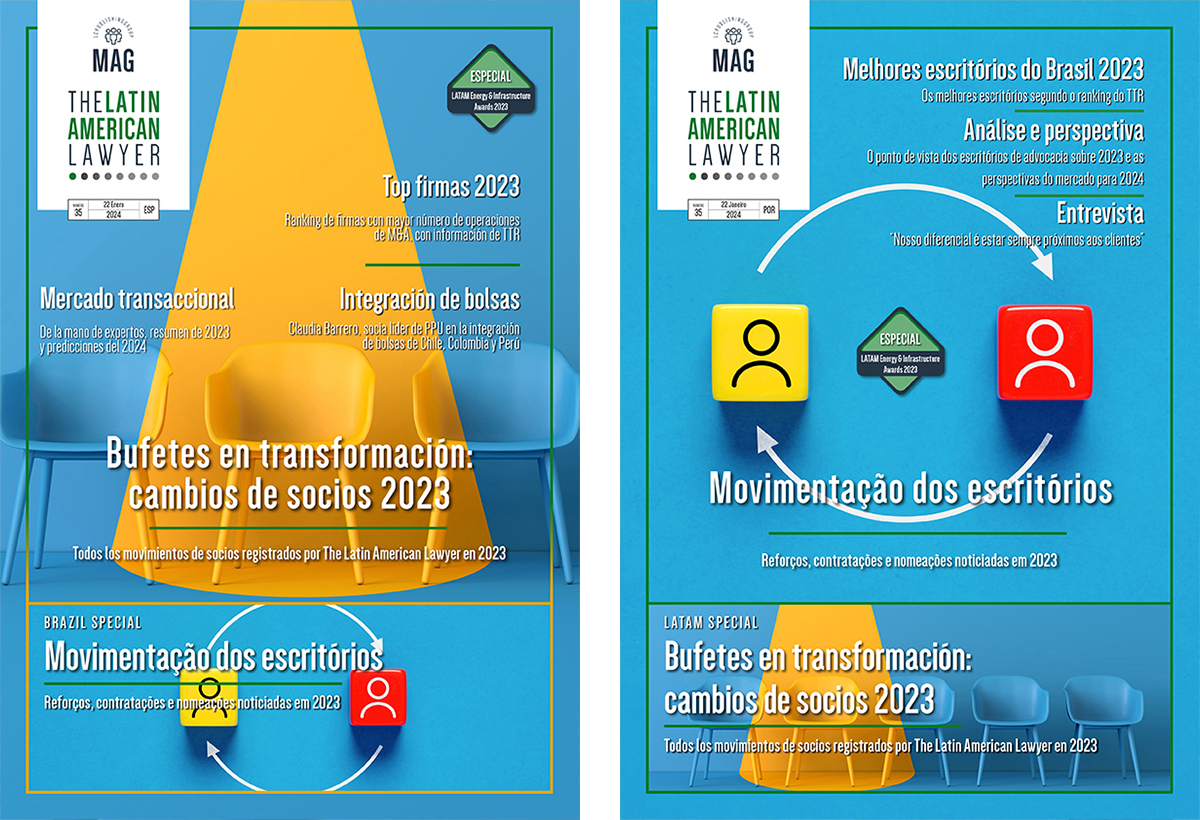Special focus: Latin America: Positive thinking
Corruption scandals in the Pacific Alliance could deter investors, it is argued, but there is still optimism regarding the region’s economic prospects despite uncertainty surrounding NAFTA
Though the Pacific Alliance countries may have been tainted by high-level corruption scandals which, some lawyers argue, jeopardise future transactional activity, there is still considerable optimism that the region offers significant potential for economic growth. Concerns over corruption are high in a region still reeling from the Operation Car Wash investigation, which began in Brazil in 2014 but spread until it implicated politicians in several Latin American countries in a money laundering scandal. Peru, in particular, has felt the impact, with the country entering another period of uncertainty after president Pedro Pablo Kuczynski resigned at the end of March this year. His is the latest high-profile Peruvian scalp claimed by the Odebrecht scandal (which concerned bribes paid by the Brazilian oil company) – former Peruvian president Ollanta Humala is already jail in as a result of this case while another former president, Alejandro Toledo, is on the run and wanted by Peruvian authorities.
Lawyers in the Pacific Alliance countries (namely Colombia, Chile, Mexico and Peru) warn that such corruption cases have a negative impact on deal making. Carolina Solano, partner at VS+M Abogados, says the main risk is that, given there is not a significant volume of business generated in the Pacific Alliance, could potentially mean “there would be no business or companies to advise”.
However, despite such concerns, some lawyers remain upbeat. “Peru has had the best economic policies during the last few years in terms of infrastructure and agricultural development,” remarks one Peruvian lawyer. “Also, it has remarkably business-friendly legislation and has proved it is able to follow the growth path despite political issues.”
 Peruvian promise
Peruvian promise
A recent survey of lawyers based in the Pacific Alliance region – conducted by The Latin American Lawyer – indicated that, in general, the outlook for the region remains positive. A total of 64 per cent of lawyers (up from 61 per cent last year) said they were optimistic regarding opportunities in the four countries that make up the Pacific Alliance, with a further 27 per cent (up from 20 per cent last year) saying they are “very optimistic”. Alfredo Bullard, senior partner at Peruvian law firm Bullard Falla Ezcurra, says: “This a country with more than 20 years of economic stability and growing.” He also says he anticipates more business opportunities in agribusiness, projects and services such as technology and real estate. Tourism is another growing sector in Peru, according to Angela López Molina, partner in the Madrid office of DS Ovslaw, who adds: “Despite the fact that Chile is the country with the highest level of legal and economic security in the region, it would seem that Peru will be the country offering the best growth opportunities in 2018, 2019 and beyond.”
However, despite the feeling of optimism in the Peruvian legal market, most lawyers in the Pacific Alliance countries believe the best opportunities for growth lie elsewhere. The survey showed that, overall, lawyers place Peru behind the other three members of the Pacific Alliance when it comes to ranking countries according which offer the best prospects for growth. Mexico is seen as the leader, with Chile and Colombia tied in joint second place, followed by Peru.
Chilean cheer
Business confidence has returned to the Chilean market following the presidential election at the end of 2017, lawyers say. “The new government of Sebastian Piñera will improve the growth of the Chilean economy and the country remains a platform for foreign corporations to do business in this region,” says Rodrigo Albagli, managing partner of Chilean law firm Albagli Zaliasnik. A total of 23 per cent of respondents said they thought Chile offers the best growth prospects of all the Pacific Alliance countries, up from 11 per cent in the 2017 survey.  The positive outlook for Chile is reinforced by a recent study by Baker McKenzie and Mergermarket which surveyed senior executives from North America, Europe and Asia – the study revealed that Chile was the Pacific Alliance country that the executives were most likely to target when making acquisitions in the coming year. A total of more than 70 per cent said they would target Chile, with around 65 per cent naming Brazil, slightly more than 60 per cent eyeing Mexico and around 35 per cent targeting Colombia. Roberto Guerrero, partner at Guerrero Olivos in Chile, says: “Projections for this year are very optimistic, expected price increases in metals and commodities and a decrease in the cost of energy are bound to push Chile’s economic growth.”
The positive outlook for Chile is reinforced by a recent study by Baker McKenzie and Mergermarket which surveyed senior executives from North America, Europe and Asia – the study revealed that Chile was the Pacific Alliance country that the executives were most likely to target when making acquisitions in the coming year. A total of more than 70 per cent said they would target Chile, with around 65 per cent naming Brazil, slightly more than 60 per cent eyeing Mexico and around 35 per cent targeting Colombia. Roberto Guerrero, partner at Guerrero Olivos in Chile, says: “Projections for this year are very optimistic, expected price increases in metals and commodities and a decrease in the cost of energy are bound to push Chile’s economic growth.”
The mining and energy sectors are likely to generate work for Chilean lawyers, says Gonzalo Delaveau, founding partner at Honorato|Delaveau. He adds that he expects local law firms to expand as the economy stabilises. Meanwhile, Winston Alburquenque, partner at Vergara Galindo Correa Abogados, says law firms are anticipating economic growth and an increase in business. With increased investment in the country expected, Sebastián Guerrero, partner at tax boutique Guerrero Valle Garcés Abogados says law firms need to be ready to advise new clients. Meanwhile, Alburquenque argues that the government needs to introduce reforms that promote investment and economic equality as well as efforts to reduce the crime rate.
NAFTA: What next?
Mexico is the Pacific Alliance country that offers the best growth opportunities, according to 31 per cent of respondents to the survey. This is despite the country facing uncertainty due to the upcoming presidential election on 1 July and the ongoing renegotiation of the North America Free Trade Agreement (NAFTA).
Gabriela Pellón, partner at Galicia Abogados in Mexico City, says that there is significant economic growth potential in Mexico, particularly in the financial services, fintech and energy sectors. Mexico will have great, and probably above average, growth opportunities in economic terms in the years to come,” Pellón says. She adds that, while the NAFTA renegotiation has generated a perception of instability in Mexico and other Pacific Alliance countries, these remain attractive emerging markets for foreign businesses and investors, and there are high hopes that the renegotiated treaty could actually result in a beneficial outcome for the region.
Gerardo Calderon, senior associate at Baker McKenzie in Mexico, points out that the country´s current stability and close proximity to the US, as well as its strong economy, means Mexico is the best place to do business in the region. He also says increased levels of enforcement in areas such as antitrust and anticorruption are expected to drive increased demand for legal advice.
Lawyers are preparing themselves for a range of outcomes from the renegotiation of NAFTA. Jorge G. De Presno, partner at Basham, Ringe y Correa, expects increased involvement from Mexico in the Pacific Alliance if it considers the result of the NAFTA negotiations to be less than positive. He forecasts growing cross border transactions within the Pacific Alliance creating demand for multidisciplinary legal advice in growth sectors such as financial services, manufacturing, infrastructure and tourism. Meanwhile, Juan Francisco Torres Landa, partner at Hogan Lovells, argues that there is a growing need for multi-jurisdictional regulatory reviews and improvement to international trade rules in the Pacific Alliance.
 Worsening conditions?
Worsening conditions?
The renegotiation of NAFTA will also involve new obligations for Mexico that will probably have an impact on trade negotiations within the Pacific Alliance, says Wilson Herrera, director of legal services at PwC in Colombia. “Mexico must look for a balance between the obligations of the two agreements in order to benefit both the NAFTA countries and those of the Pacific Alliance,” he says. Herrera also notes that law firms across the region should establish alliances in all the countries of the Pacific Alliance with the aim of offering an integrated service.
Concerns remain regarding the differences between the legal systems of Colombia, Chile, Mexico and Peru, says Juan José Iturbe, partner at Mexican law firm Malpica, Iturbe , Buj y Paredes. However, he expects more business opportunities, particularly for local law firms, across the region after the renegotiation of NAFTA. However, Francisco González, founding partner at González & Rioseco in Chile, sounds a note of caution regarding NAFTA: “We might end up with worse conditions for countries exporting to the United States.” According to González, excessive regulation and the arbitrary nature of the state remain challenges for clients and law firms doing business in the region.
Colombia might benefit from the renegotiation of NAFTA as it might result in the country increasing its exports to the US market, lawyers say. José Francisco Mafla, partner at Brigard Urrutia in Bogota, says that Colombia is attractive to international investors because of its large population, growing middle class, unexploited agribusiness opportunities and infrastructure pipeline. Having a big population with a growing middle class makes Colombia a “rising star in the region”, says Guillermo Villegas, partner at Medellin-based law firm Contexto Legal. Villegas adds that opportunities for law firms in the Colombian agribusiness, projects, services and tourism sectors are on the increase.















